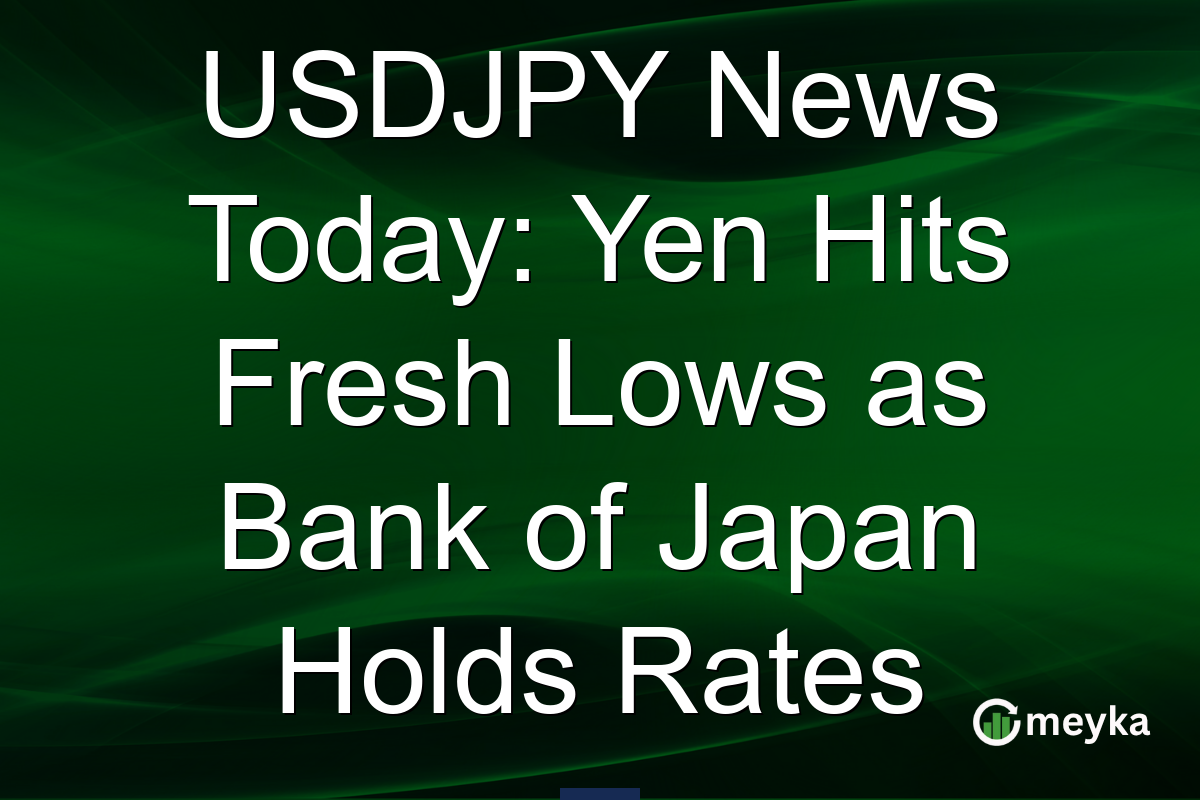USDJPY News Today: Yen Hits Fresh Lows as Bank of Japan Holds Rates
Today, the USDJPY exchange rate news unveils significant movements in the currency market. The Japanese yen has plunged to fresh lows against the U.S. dollar following the Bank of Japan’s decision to maintain its current monetary policy. Despite rising inflation, the central bank surprised many by holding rates steady, igniting volatility and speculation about future currency interventions.
The Bank of Japan’s Rate Decision
The Bank of Japan (BoJ) announced today that it would keep its monetary policy unchanged, with interest rates remaining in negative territory at -0.1%. This decision surprised many economists who anticipated a shift due to inflationary pressures. Governor Haruhiko Kuroda emphasized that the bank’s primary focus remains on achieving stable inflation rather than immediate rate hikes. For investors watching the yen slides against the dollar, this decision signals prolonged monetary easing.
The BoJ’s stance is in stark contrast to global trends, where central banks like the Federal Reserve are tightening policies. This divergence is a key driver for the USDJPY exchange rate news, as it often leads to capital flows favoring higher-yielding currencies like the USD.
Market Reaction to Yen’s Decline
Following the announcement, the yen quickly dropped to its lowest levels since October 2023, trading at 147.50 per dollar. The market response highlights investor sentiment that the yen may continue to weaken if the BoJ persists with its dovish policies. The USDJPY pair, represented by USDJPY=X, showed increased volatility, reflecting trader concerns over Japan’s economic outlook.
For further insights, see the full report on Bloomberg’s coverage on the dollar’s rise against the yen. The market’s immediate reaction underscores potential interventions by Japanese authorities if the yen’s weakness becomes destabilizing.
Japanese Currency Forecast Concerns
With the yen sliding against the dollar, the focus shifts to the future of Japanese currency forecast. Analysts are divided on whether the BoJ will intervene directly in the forex markets. Some suggest that the central bank might allow further depreciation if it helps boost export competitiveness, while others warn of the risks associated with currency volatility.
Yen’s performance is crucial for Japan’s economy, heavily reliant on trade. If the currency remains weak, it could support exports but increase import costs significantly. Investors tracking the yen may find these dynamics critical in assessing future trades and currency developments.
Investor Insights and Market Sentiment
For investors, the recent USDJPY exchange rate news highlights the importance of understanding central bank policies and their impacts on currency pairs. The yen’s fall against the dollar has opened new trading avenues but also cautioned investors about potential risks.
As reflected in discussions on financial forums, like Reddit, traders are actively debating whether the yen will stabilize or continue its downward trajectory. Sentiment analysis from platforms like Meyka can offer real-time predictive analytics and insights into these evolving market trends.
Final Thoughts
The recent movements in the USDJPY exchange rate demonstrate the profound impact central bank decisions can have on currency markets. The Bank of Japan’s unwavering commitment to its current policy stance has highlighted the yen’s vulnerability and sparked discussions around potential government interventions. For investors, navigating these waters will require careful attention to monetary policy developments and their broader implications.
Meyka’s AI-powered financial insights can provide investors with real-time data and predictive analytics to monitor these trends effectively. As the yen’s position evolves, staying informed and adaptive remains crucial for sound investment strategies.
FAQs
The yen declined after the Bank of Japan decided to keep its monetary policy unchanged despite inflationary pressures. This contrasts with global trends where central banks are tightening policies, leading to a stronger U.S. dollar.
As of today, the yen is trading at approximately 147.50 per U.S. dollar. This represents a significant drop, reflecting recent currency market volatility.
While the BoJ has not indicated immediate intervention, analysts are speculating that if the yen’s depreciation threatens economic stability, the bank may take action to stabilize the currency.
Disclaimer:
This is for information only, not financial advice. Always do your research.






